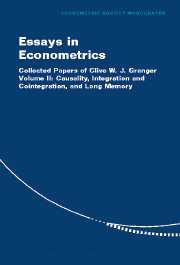Book contents
- Frontmatter
- Contents
- Acknowledgments
- List of Contributors
- Introduction
- PART ONE CAUSALITY
- 1 Investigating Causal Relations by Econometric Models and Cross-Spectral Methods
- 2 Testing for Causality: A Personal Viewpoint
- 3 Some Recent Developments in a Concept of Causality
- 4 Advertising and Aggregate Consumption: An Analysis of Causality
- PART TWO INTEGRATION AND COINTEGRATION
- PART THREE LONG MEMORY
- Index
4 - Advertising and Aggregate Consumption: An Analysis of Causality
Published online by Cambridge University Press: 06 July 2010
- Frontmatter
- Contents
- Acknowledgments
- List of Contributors
- Introduction
- PART ONE CAUSALITY
- 1 Investigating Causal Relations by Econometric Models and Cross-Spectral Methods
- 2 Testing for Causality: A Personal Viewpoint
- 3 Some Recent Developments in a Concept of Causality
- 4 Advertising and Aggregate Consumption: An Analysis of Causality
- PART TWO INTEGRATION AND COINTEGRATION
- PART THREE LONG MEMORY
- Index
Summary
This paper is concerned with testing for causation, using the Granger definition, in a bivariate time-series context. It is argued that a sound and natural approach to such tests must rely primarily on the out-of-sample forecasting performance of models relating the original (non-prewhitened) series of interest. A specific technique of this sort is presented and employed to investigate the relation between aggregate advertising and aggregate consumption spending. The null hypothesis that advertising does not cause consumption cannot be rejected, but some evidence suggesting that consumption may cause advertising is presented.
INTRODUCTION
This paper is concerned with two related questions. The first is empirical: do short-run variations in aggregate advertising affect the level of consumption spending? Many studies find that advertising spending varies pro-cyclically. But firms often use sales- or profit-based decision rules in fixing advertising budgets, so that observed correlation might reflect the effect of advertising on consumers' spending decisions, the effect of aggregate demand on firms' advertising decisions, or some combination of both effects. Previous studies of this empirical question, surveyed in Section 2, do not adequately deal with the problem of determining the direction of causation between consumption and advertising.
The second question with which we are concerned is methodological: how should one test hypotheses about causation in a bivariate time series context? Section 3 proposes a natural approach to such tests that is a direct application of the definition of causality introduced by Granger.
Information
- Type
- Chapter
- Information
- Essays in EconometricsCollected Papers of Clive W. J. Granger, pp. 84 - 106Publisher: Cambridge University PressPrint publication year: 2001
